Comoros' Fouad Bachirou on advice and inspiration from Claude Makelele
- Published
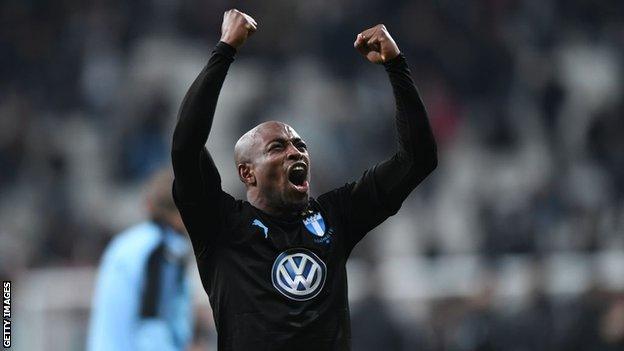
Comoros midfielder Fouad Bachirou has been at Swedish club Malmo since 2018
Comoros and Malmo midfielder Fouad Bachirou has told BBC Sport that much of his determination to succeed is due to the advice and inspiration of France great Claude Makelele.
The 29-year-old now seems to have settled in Sweden, where he has played since 2014 after leaving Scottish side Greenock Morton.
At the same time the France-born, former Paris Saint-Germain youth player, has helped resurrect an all-but dormant Comoros national team.
Bachirou says that the one player who inspired him the most is the DR Congo-born Makelele, who he trained with at PSG.
"Makelele was the best in the world in his position for many years so to learn from him was a real honour," Bachirou tells BBC Sport.
"Like him I was a small central midfielder and I had actually been rejected by Auxerre and Nice when I was younger because they didn't think I was big enough.
"It used to be that everyone wanted tall, powerful midfielders like Patrick Vieira but Makelele changed that - he was the exception, the small guy in midfield who could still win a lot of balls, and influence the game.
"He made me believe I could make it."
The early years
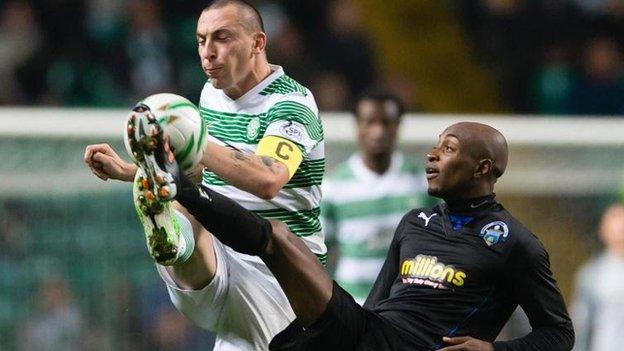
Fouad Bachirou (right) battles with Celtic captain Scott Brown during his time at Scottish side Greenock Morton
Born and raised in the suburbs of Paris, Bachirou joined the PSG academy aged 14, where Crystal Palace and ex-Liverpool defender Mamadhou Sakho was among his team-mates.
As part of the academy he was regularly exposed to PSG first-team stars including Stephane Sessengon, Ludovic Giuly, Jerome Rothen and Mateja Kezman.
Bachirou did not manage to make it into the PSG first-team but he was soon playing senior football - albeit in an unlikely location.
After a transfer to Italy fell through, he joined Scottish second-tier team Greenock Morton in 2010, immediately becoming a fan-favourite because of his all-action style.
He stayed at the club for four years and came away with more than just fond memories.
"I met my wife Debbie in Greenock which I obviously didn't expect as a 20-year-old moving to Scotland," he explained.
"Before I went there I had never even heard of Greenock and if you'd told me as a young boy in Paris that I would play football in this Scottish town, I think I would have laughed.
"It was difficult at first because like any good French person I didn't speak any English.
"But I loved my time there and I had amazing support from the fans from the first day, they helped me a lot.
"Unsurprisingly the football was much more direct than what we had learned in the PSG Academy and I remember not even touching the ball in some of the early games. But I learned to adapt."
A move to Sweden
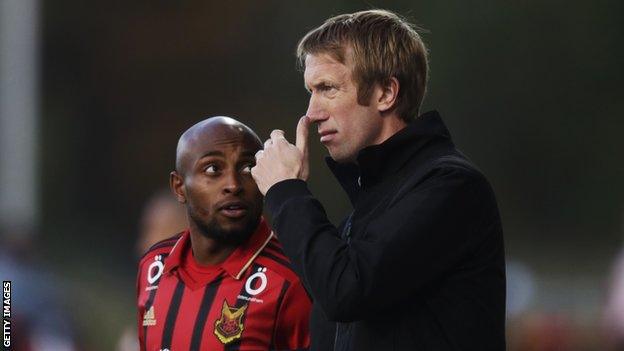
Fouad Bachirou played for the Brighton coach Graham Potter when they were both at Swedish club Ostersunds
2014 saw him move to Graham Potter's Ostersunds, a second-tier Swedish side with big ambitions.
The club's meteoric rise is now well documented and Potter's progression to Premier League boss with Brighton has come as no surprise to Bachirou.
"He is a very special coach with a great idea of how to play football," Bachirou says.
"He built the identity of Ostersunds and has done the same with his other clubs. He makes you a better player, whatever your level.
"If you are an average player, you become a good player; if you are a good player he will make you a great player. This to me is what makes a fantastic football coach.
"I loved playing for him and it was a beautiful adventure with Ostersunds.
"I doubt anyone who has played for him is surprised he is now a Premier League coach - all my old team-mates would say the same.
"I expect even bigger things ahead for him; he can for sure be at one of the top five clubs in England in the future. It takes courage to believe in your ideas and pursue them."
Comoros on his mind
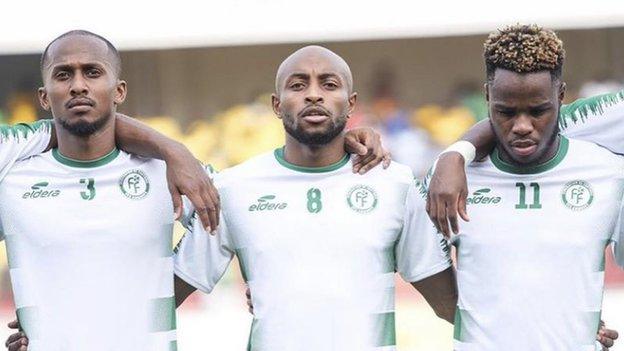
France-born Fouad Bachirou (centre) is proud to represent Comoros where his mother was born and grew up
Taking a leaf from Potter's book, Bachirou felt increasingly inclined to follow an ambitious idea of his own: to play international football for Comoros.
Although born in Paris, Bachirou was made aware of his Comorian roots from an early age by his mother, who was born and raised in Comoros and regularly took her family on holidays back to her homeland.
"I remember visiting Comoros and it feeling a lot safer than Paris," he explained.
"When you are in France as a young kid, your mum is really worried if you are going out to play football on the streets but in Comoros we would leave in the morning, play all day and come home late at night, no problem. In the forest, the beach - it was a beautiful freedom.
"I had never really thought much about international football when I was young - either for France of Comoros - because I was just so focused on trying to become a professional footballer.
"As I got older I started to think it would be great to play for Comoros - I knew it would mean a lot to my mum. The only problem was Comoros didn't actually have a national team at the time."
The country's football history is a tumultuous one that began with the formation of the Comoros Football Federation (FFC) in 1979 for the Indian Ocean Island Games.
It would be another 26 years before Comoros was welcomed into Fifa and a further year before the country's first official game in almost three decades - a 2-0 Arab Nations Cup qualifying defeat to Yemen in December 2006.
By the time Bachirou began considering playing for Comoros, the tiny island nation - with a population of just 850,000 - had been in international exile again.
More than two years had elapsed since Comoros played out a 4-1 World Cup qualifying defeat to Mozambique in November 2011.
A chance to play for Comoros
In 2014, newly appointed coach Amir Abdou arrived with big dreams for Comoros.
The Marseille-born Comoran reached out to the mainly France-based diaspora and began stitching together a new national team.
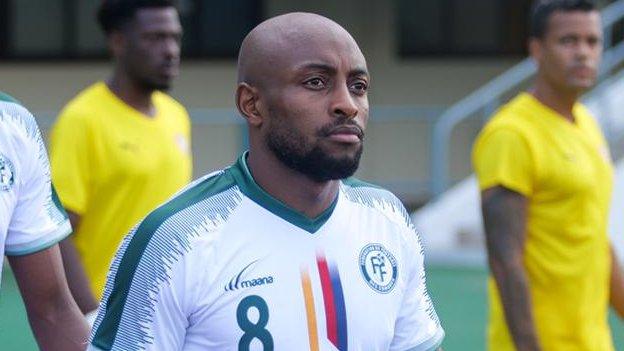
Fouad Bachirou's dream is to help Comoros qualify for its first Africa Cup of Nations finals
Bachirou again found himself in the right place at the right time and in March 2014 made his international debut in a friendly against Burkina Faso, in Marseille.
"The coach called me up and straight away I said yes," Bachirou recalls.
"Comoros is part of me and from a young age I knew all about my heritage - we spoke the language at home with my mum and sisters.
"My debut was very special because it was the first match Comoros had played in two-and-a-half years and it was obvious how much that meant to the Comorian community in France who came to watch us.
"They were so enthusiastic about having their national team back and it was very emotional for the players; it felt a big moment and straight away I was incredibly happy to be part of.
"Of course, my mum was very proud too, perhaps the proudest she's ever been."
Aiming for the 2021 Nations Cup
Since then, Abdou's team has developed into an exciting collective that has troubled many traditional African heavyweights. Draws with Morocco, Ghana and Cameroon have served to build confidence but now Comoros have greater ambitions.
Currently sitting atop their 2021 Africa Cup of Nations qualifying group, Comoros have beaten Togo and drawn with Egypt in their opening two matches.
The latter was Comoros' first game at their new Chinese-funded, 10,000-capacity Malouzini Stadium in the capital city of Moroni which replaced an astroturf pitch that Bachirou said was very poor.
"To see ourselves now growing into this new stadium is something beautiful," he says.
"People don't know the amount of joy there is in Comoros when we play games at home; it doesn't matter about the result - we are children of Comoros coming home and that means a lot to people.
"For a week it is madness in the country. I remember it once took us two and a half hours to make a 40-minute journey after a draw against Ghana because the fans were in the streets celebrating like we had won the World Cup.
"To get this great stadium - it brings strength to them and the players too."
In December 2006, Comoros were officially the worst-ranked team in the world according to football's world governing body, Fifa.
Now expectations are growing that they can follow the blueprint of fellow islanders Madagascar and secure a Nations Cup debut that would have seemed absurd a few short years ago.
"We played Madagascar in a friendly in Paris back in 2017 and competed well against them - it finished 1-1," he pointed out.
"When we saw them at the Africa Cup of Nations last year, I remember saying 'look how great they are doing, that could be us'.
"It was a wake-up call that, actually, if they can get there the we can get there. Now we believe it is possible.
"There is still a long way to go of course but we have been working very hard since 2014.
"There were many times we played really well against some big teams but the results didn't come.
"But there has been a turning point recently and we have been able to see out more games. We have a young squad but it is maturing all the time.
"The coach has made us see that we just needed to be patient. It is a long process to put together a successful team and we are a very small country that has never qualified for a big tournament.
"Hopefully, now we can qualify for the Africa Cup of Nations which would be something huge for Comoros."
Their next Nations Cup qualifiers come in March with away and home fixtures against Kenya.